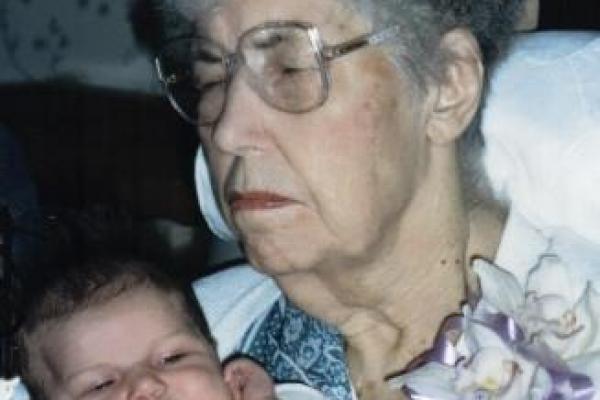With Mother’s Day just around the corner, I’ve been thinking about the matriarchal blessing—the moment when an old woman, staring death in the eye, communicates to a
 younger female relative or friend that life is good and love is eternal.
younger female relative or friend that life is good and love is eternal.
As far as I know, the only mention in the Bible of an older woman blessing a younger woman is when Elizabeth says to her young, unwed, pregnant relative Mary: “Blessed are you among women, and blessed is the fruit of your womb” (Luke 1:42). Elizabeth probably wasn’t the matriarch of her family, and she wasn’t about to die, but her Spirit-inspired words were still similar to a matriarchal blessing. She welcomed the new life growing in Mary, and her loving hospitality surely must have given courage to the baffled young mother-to-be.
The more typical matriarchal blessing, however, is a deathbed event (think of Isaac blessing Esau and, inadvertently, Jacob; or Jacob blessing his own sons and grandsons).
“The last time I saw my mother alive was very, very special,” my friend Kathleen told me. Her mother, who was 90 years old, had been declining from Alzheimer’s disease for several years. “She was trying to talk about something but couldn't make words that were comprehensible, so she just decided to go to sleep. She must have napped for about a half hour. I stayed with her and held her hand. Her skin was so transparent that I wondered if she would die right then. But no. She woke up and squeezed my hand, and we had a chance to tell each other how much we loved each other. It was one of the best times I ever had with my mother.”
Kathleen and her mother exchanged very few words that day, but the message of love and continuity was clear. And sometimes the blessing is given with no words at all.
A week or so before my wedding date, my 91-year-old grandmother was taken to the hospital. She was not in pain, but she seemed to be in a coma. The doctors said she was dying. “Should I postpone the wedding?” I asked my parents. “No,” they said, “she would want you to go ahead.”
A few days before the wedding, I visited Grandma in the hospital. I took her hand, wondering if she sensed I was there. I spoke, wondering if she could hear. “Grandma,” I said, “I’m going to get married on Sunday.” She opened her eyes, pushed herself up on her elbows, and gave me a great big smile. I knew without a doubt that she had just given me her blessing.
My grandmother died about three weeks later, in April. Almost exactly 27 years after her death, my first grandchild was born. When Katie was five weeks old, she met my 85-year-old mother, her great-grandmother, for the first and only time. Mother had been suffering for six years with dementia. For more than a year, following a series of small strokes, she had been unable to speak. I visited her at the nursing home nearly every day, but it was impossible to know if anyone was at home behind her sad, blank eyes.
On Mother’s Day, four of us gathered in her room to honor her: me, my two daughters, and Katie. Mother was sitting in her recliner, and Molly carefully laid Katie on her lap, arranging Mother’s arms around the baby since Mother was unable to arrange them herself. (The picture at the beginning of this post shows my mother with her great-granddaughter.) Molly stepped back to look at the exhausted old woman cradling the healthy new baby—and suddenly Mother bent her head down and planted a kiss on baby Katie’s forehead.
That was a matriarchal blessing beyond all hoping.
Mother died quietly the following month. Katie is now a teenager. Life is good, and love is eternal.
LaVonne Neff is an amateur theologian and cook; lover of language and travel; wife, mother, grandmother, godmother, dogmother; perpetual student, constant reader, and Christian contrarian. She blogs at Lively Dust and atThe Neff Review.
Got something to say about what you're reading? We value your feedback!
